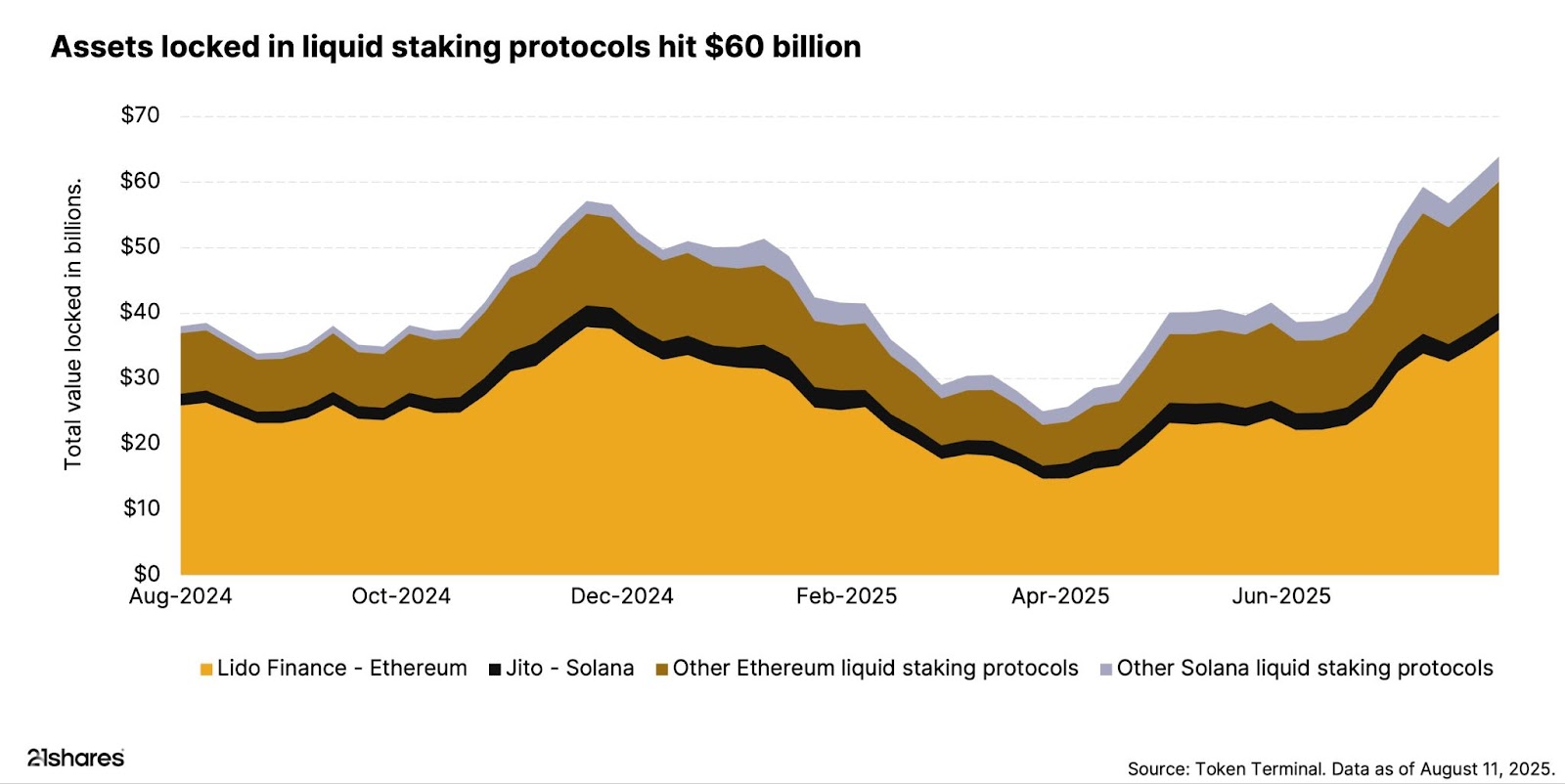What is liquid staking, and why the SEC’s update matters for investors



In crypto, staking is pretty common.
Think of it like putting your money into a savings account at the bank. When you deposit your money in a bank, the bank uses it for things like loans, and you earn interest.
Staking works the same way: you deposit your cryptocurrency to help run and secure a blockchain network. Your staked coins give validators the right to verify transactions and add new blocks. In return for supporting the network, you earn rewards, usually paid in the same cryptocurrency you staked.
It’s a common practice for holders of proof-of-stake (PoS) tokens, like Ethereum or Solana, who want to support the network. Usually, staked tokens are locked for a set period, which means you can’t use, trade, or move them until that lockup ends.
What’s liquid staking and why is it making headlines?
When you stake tokens, they just sit there earning rewards until the lockup ends. With liquid staking, you use a service like Lido (for Ethereum) or Jito (for Solana), who, in return, give you a special token, sometimes called a “staking receipt,” that represents your staked crypto plus any rewards it earns. The interesting part is that you can trade this receipt token, use it in decentralized finance (DeFi), or lend it out while your original crypto stays staked.
Think of it like putting money in a fixed-term savings account, but the bank gives you a voucher you can still spend or invest while they hold your actual cash.
Recently, the US Securities and Exchange Commission (SEC) said certain liquid staking tokens are not securities. This is a big win for the DeFi world, as historically, the SEC has often treated tokens as securities and claimed regulatory control over them.

What’s the SEC’s stance on liquid staking?
On August 5, the SEC announced:
- Liquid staking services like Lido, Marinade Finance, JitoSOL, and Stakewise don’t need to register with the SEC, as long as they operate within the rules laid out in the guidance.
- Issuing “staking receipt tokens,” which show ownership of staked assets and any rewards earned, is not considered a securities offering, unless the crypto behind it is part of an investment contract.
SEC moves from resistance to collaboration
This is great news for investors as the SEC’s clarification has removed a major cloud of uncertainty for liquid staking providers and the broader DeFi ecosystem.
This guidance not only paves the way for including staking in proposed spot Ethereum ETFs but also reinforces liquid staking’s role as a powerful liquidity tool in DeFi. By confirming that staking receipt tokens are not securities, the SEC is signaling a willingness to work with rather than against innovative crypto models.
Industry experts say the decision addresses one of the SEC’s past concerns about liquidity management in ETFs, making it more likely that staking could be included in future Ethereum products. Legal analysts add that the implications may stretch beyond staking, potentially shaping how regulators treat other proof-of-ownership instruments such as wrapped tokens and cross-chain bridge receipts.
With Project Crypto reforms underway, the takeaway is clear: US regulation appears to be turning more crypto-friendly, and staking is at the forefront of that shift.
This report has been prepared and issued by 21Shares AG for publication globally. All information used in the publication of this report has been compiled from publicly available sources that are believed to be reliable, however, we do not guarantee the accuracy or completeness of this report. Crypto asset trading involves a high degree of risk. The crypto asset market is new to many and unproven and may have the potential not to grow as expected.Currently, there is relatively small use of crypto assets in the retail and commercial marketplace in comparison to relatively large use by speculators, thus contributing to price volatility that could adversely affect an investment in crypto assets. In order to participate in the trading of crypto assets, you should be capable of evaluating the merits and risks of the investment and be able to bear the economic risk of losing your entire investment.Nothing herein does or should be considered as an offer to buy or sell or solicitation to buy or invest in crypto assets or derivatives. This report is provided for information and research purposes only and should not be construed or presented as an offer or solicitation for any investment. The information provided does not constitute a prospectus or any offering and does not contain or constitute an offer to sell or solicit an offer to invest in any jurisdiction. The crypto assets or derivatives and/or any services contained or referred to herein may not be suitable for you and it is recommended that you consult an independent advisor. Nothing herein constitutes investment, legal, accounting or tax advice, or a representation that any investment or strategy is suitable or appropriate to your individual circumstances or otherwise constitutes a personal recommendation. Neither 21Shares AG nor any of its affiliates accept liability for loss arising from the use of the material presented or discussed herein.Readers are cautioned that any forward-looking statements are not guarantees of future performance and involve risks and uncertainties and that actual results may differ materially from those in the forward-looking statements as a result of various factors.This report may contain or refer to material that is not directed to, or intended for distribution to or use by, any person or entity who is a citizen or resident of or located in any locality, state, country or other jurisdiction where such distribution, publication, availability or use would be contrary to law or regulation or which would subject 21Shares AG or any of its affiliates to any registration, affiliation, approval or licensing requirement within such jurisdiction.









_logo.svg)

.svg.png)